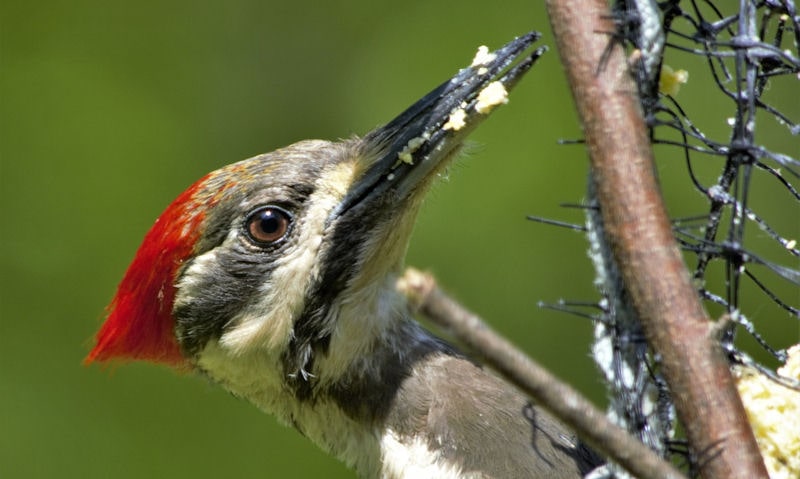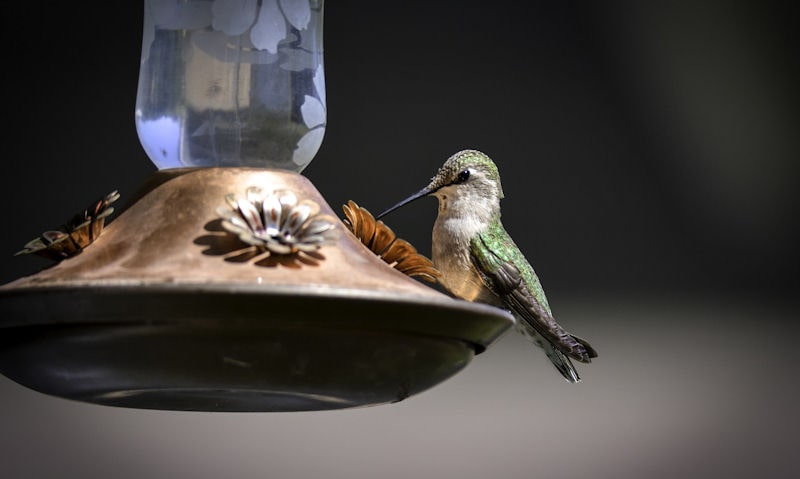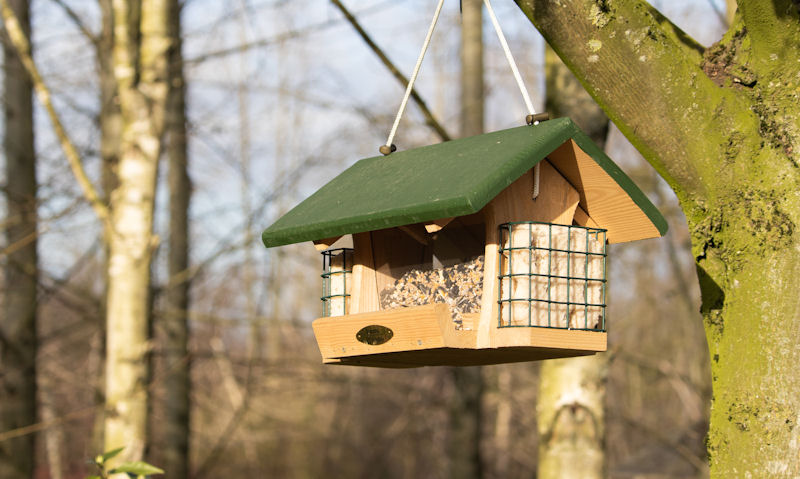Why do birds eat suet
No doubt about it this crucial wild bird food must be offered to our backyard birds as a popular source of energy, in which birds prioritize more in winter.
Why birds like suet is because it often contains ingredients that is close to what they normally eat in the wild. While birds ingest beef fat that makes up the bulk of the suet cake or fat ball. What birds are really eating is seeds, peanuts, fruits or other ingredients. Result of that is an energy boost birds need in winter.
What is so great about suet is it can be left out all year round even if a certain group of birds prioritize other bird food, when it comes to what's available on bird feeders.
How long suet can last outdoors is less than a week in summer while it can last a couple of weeks in winter- which is just as well as suet must be fed to birds at this time of year.
Why birds eat suet is because it can replace body fat that would of been lost as wild birds spend most of the day foraging.
Less so in summer yet their once readily available natural feed found in the wild would be more scarce in wintertime - due to frosted over grounds or snow blanketing the their usual feeding ground where earthworms are found.
Why birds eat suet isn't because its tasty as birds have no taste buds, yet its easy to ingest while often more readily available in our yards then any other bird food.
Suet is incredible good for birds as suet cakes or fat balls can be fed to them with no risk of choking - yet poor quality suet can be accidentally smothered in their feathers.
While taking that into consideration, bear in mind homemade suet is softer so will likely melt under the heat of the sun. With that homemade suet tends to go rancid more quickly whereby store-bought suet lasts a little bit longer.
Play it say by buying store-bought quality suet cakes for birds until you can make up a wild bird suet recipe at home that is guarantee to last longer.
Suet easily ingested
What you must know about suet in any of its forms when fed to common backyard birds, is its easily ingested, and therefore possible to eat by many birds.
You see there are birds who can crack open a shell of nut or break into a seed for its meat; whereby much softer suet can be eaten by all these birds plus those who can only bite into softer wild bird food.
Why birds eat suet then is because its very accessible to them whereby other bird food hanging up in bird feeders have its limit.
No such limitation in suet cakes or fat balls as birds who visit our yards eat it because its easily ingested.
With that in mind of course wild birds eat suet in your yard because its readily available, yet provides vital ingredients they need as part of their diet. While suet lasts much longer then their regular bird seeds or peanuts.
Easily ingested suet might be then but most of all, any suet intake gives our birds a boost of energy.
Fatty source of energy
While any type of suet made available in our yards is primarily made up of beef fat - which can be up to 90% fat - all of this then can lead to a source of energy.
Its true pure beef fat can have health benefits if eaten in small quantities at a time. And as birds will feed on suet to give themselves more energy - it will allow them to forage for longer - so this is why birds eat suet.
While a lot of fatty suet can be ingested I wouldn't say its the beef fat birds are really eating, or not eating on purpose that is.
What birds eat is secondary ingredients making up the suet cakes or fat balls, of which the fatty suet happens to be swallowed by birds in the process.
Birds eat suet as a source of energy which is part of their diet, with vitamins or protein can also be ingested due to the beef fat suet bonded with seeds, dried mealworms, fruits or peanuts making up the ingredients.
Be sure there's always suet made available in your feeders or supply suet in pellet form to offer outside of bird feeders.
Feed birds suet in winter
Why birds eat suet is because they need a source of energy food, of which only a fatty suet cake or fat ball can quickly supply them in your yard.
And while birds are sure to eat just as much suet fed to them in the summer, priority of suet fed to wild birds must be in wintertime.
You see cold, sometimes harsh weather over the winter will result in food found in the wild becoming harder to forage for. As a result birds will use up more energy to make sure they can feed on a proper supply of energy food via protein rich insects.
Feed suet to wild birds in winter then, especially when its coldest as the ground freezes over with snow blanketing your State - as to be sure the suet can be fed on when they need it most.
Low risk of suet freezing over in sub-zero conditions although it can preserve the suet for longer in colder conditions - whereas the heat of the sun can rapidly spoil suet.
Why must birds eat more suet in winter then is to replace lost energy, including any body weight lost due to the extra foraging they do as less wild bird food eaten.
Birds have favorite suet flavors
Birds who come to feed on your suet cakes or fat balls hanging up in a cage bird feeder, do so not so much for the fatty beef suet alone - but more so what the suet is made of.
While beef fat is melted down in a pan, its allowed to go cold before other, vital wild bird food ingredients are added - to create a mold that you know as suet cakes, fat balls or suet pellets... which are also known as suet nuggets.
In addition to the usual seed mixes, peanuts, fruits or dried mealworms added to the suet to create the mold - you can also expect oats or wheat to be used to hold the suet shape.
Of which all these ingredients are safe for wild birds offering vital nutritional value in themselves.
While you can buy suet cakes with multiple ingredients included, you can expect all birds in the yard to feed this kind.
Whereby a fruit-filled only suet cake will only allow fruit-eating birds to feed on it while they prioritize eating the fruit bits or whole dried raisins or other fruits added to the suet blend.
Feeder type open to many
Why we might see birds eat suet as much as they do could be because suet is often more available to wild birds that we feed in our backyards.
On one hand most if not all wild birds can be seen to feed on suet every once in a while, and while many common songbirds are not able to feed on a bird feeder - you can still see them try on what is a more open suet bird feeder.
Seeds or peanut feeders can be restricted to seasoned birds who use them, whereby your common American Robin or Bluebird can use a suet cake bird feeder because its not enclosed - yet the suet continues to be accessible within the open cage.
Bird feeders for suet cakes or fat balls while still restricting to many birds, they can be open to the usual birds plus unexpected bird species.
Birds need an energy boost at times and as such will sure tackle a less complicated suet cake bird feeder rather than a far more restricting clear tube feeder for seeds.
Bird feeders made to hold suet of any kind don't always have to be used mind, as it can benefit you and your birds if you at least offer suet - cheap suet pellets will do it - placed on a garden surface or deck railing to allow all birds to feed if they wanted to.
To summarize
For one thing, why do birds eat suet is because for most of them, suet in cake, fat ball or pellet form is easily ingested.
Where certain bird species can break into the shell of a peanut or seed, others cannot bite through unless its fed to them with just the soft seed or nut.
Its similar to suet in all its form, and while suet appears hard to touch at first it will soften up in due course. With that you can also expect homemade suet to be far softer than its store-bought counterpart.
Of course this really isn't the reason why birds eat suet, that is primarily down to their dietary needs.
Suet is always made up in beef fat making up the prime ingredient, with other vital ingredients used plus fillers to help bind the suet into different shapes.
When birds feed on suet they are after the seeds, peanuts, dried mealworms - with real earthworms sometimes used - and fruits that make up the bulk of it.
As a bird pecks into the suet they will eat what their diet requires yet no bird will avoid ingesting a healthy intake of beef fat in the process.
Fat is unhealthy of course yet for birds its vital to keep them going as a source of energy.


